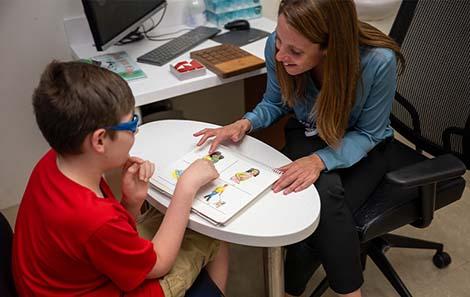Treatment for Autism & Seizures
Make an Appointment
When your child has been diagnosed with both epilepsy and autism, it’s normal to be worried. Many of the medicines that treat epilepsy can impact behavior. And the unpredictability of seizures can be stressful for families.
Seizures are one of the most common neurological complications of autism. But many providers don’t have experience treating both.
UVA Health Children’s Clinic for Autism and Pediatric Epilepsy was made with families like yours in mind. You’ll meet with your child’s epilepsy specialist and developmental specialist at the same visit. That way, your specialists can both be there to make sure your child’s needs are addressed and your questions answered.
UVA Health Children’s Clinic for Autism & Pediatric Epilepsy
As a level 4 pediatric epilepsy center, we offer the full range of epilepsy care. That includes:
- Medications (like anti-seizure medications, also called ASMs)
- Dietary therapy for epilepsy
- Surgery
- Epilepsy devices, like the vagal nerve stimulator
- Genetic counseling and testing
- Outpatient and take-home EEGs
- Inpatient EEG in our Pediatric Epilepsy Monitoring Unit (PEMU)
- Neuropsychological evaluation
- Neuroimaging for epilepsy
In addition to our epilepsy expertise, we also have developmental-behavioral pediatricians. Developmental pediatricians work closely with families to identify and manage developmental, behavioral, and learning challenges. That can mean:
- Helping families understand their child’s current skills and behavior
- Monitoring for and treating co-occurring issues, such as:
- Mood changes
- ADHD-related symptoms
- Sleeping difficulties
- Eating and digestive concerns
- Creating a plan that may include therapies, medications, or other interventions
- Connecting families to community and educational resources
- Helping families learn how to advocate for their child
At CAPE, your child may also meet with a neuropsychologist. Neuropsychologists are experts in brain function and development. They have tools to help describe your child’s strengths and weaknesses and how they’re related to the autism and epilepsy diagnoses. They also help recommend treatments or interventions they think would be helpful.

Dietary Therapy for Medical Complexities
Our dietitians have experience with medically complex children with a wide variety of needs. They can help you with food ideas and suggestions for dietary therapy.
What’s a Visit at CAPE Like?
When your child has autism and epilepsy, you don’t want to be forced to navigate a bright and busy hospital. Or worry about managing multiple appointments.
At CAPE, we see your child at our neurology clinic. Your providers will come to you in the same room. This helps reduce stress.
At the beginning of your appointment, you’ll share your goals for your child’s treatment and progress. These will shape their visit. When your child’s providers and your family are all in one visit, it allows for real-time discussion and collaboration.
This reduces back-and-forth between doctors and allows you to leave our clinic with a treatment plan that much quicker.
What If We Get Home and Don’t Remember the Plan?
Our CAPE nurse care coordinator will be your central contact for questions about your child’s seizures, behavior plan, and medication. Whether you’re not sure about something we discussed or have new concerns, get in touch with our CAPE nurse care coordinator.

Pediatric Neuropsychology
Our neuropsychologist has specialized training to evaluate children with a wide range of abilities and needs. These assessments are important for checking how your child is doing and how we can best support them.
Frequently Asked Questions About Autism & Epilepsy
Each case is unique. And your child’s provider is best able to address your concerns. But here are questions many families have when they first come to our clinic.
Does my child need to be diagnosed with both autism and epilepsy?
Yes. To be seen at CAPE, your child must already have both diagnoses. But your child can be seen at our pediatric epilepsy center if they don’t have a diagnosis of autism.
My child has autism, but I’ve never noticed seizures. How can the doctors be sure they are having seizures?
Some seizures are easy to see. Others can be difficult to notice. Seizure symptoms include:
- Rhythmic twitching or shaking of the whole body
- Rhythmic twitching or shaking of part of the body
- Sudden loss of muscle tone
- Staring off that can’t be interrupted
Sometimes your child’s providers will use a special tool, an encephalogram (EEG), to watch your child’s brain waves. This test picks up unusual electrical brain activity. This brain activity confirms that your child is having seizures.
Does having autism and epilepsy mean there’s something else causing both conditions?
Autism and epilepsy are often seen together. Sometimes there’s a clear reason for this, like:
- An underlying genetic condition
- Being born very prematurely
- Brain damage that happens during delivery (called hypoxic-ischemic encephalopathy, or HIE)
But very often, there is no clear link.
We’ll do testing to try to understand why your child has both conditions. That can include brain imaging and genetic testing.
Rarely, genetic testing will confirm a genetic condition. Some genetic conditions that can lead to both epilepsy and autism include:
- Angelman syndrome
- Fragile X syndrome
- Prader-Willi syndrome
- Tuberous sclerosis